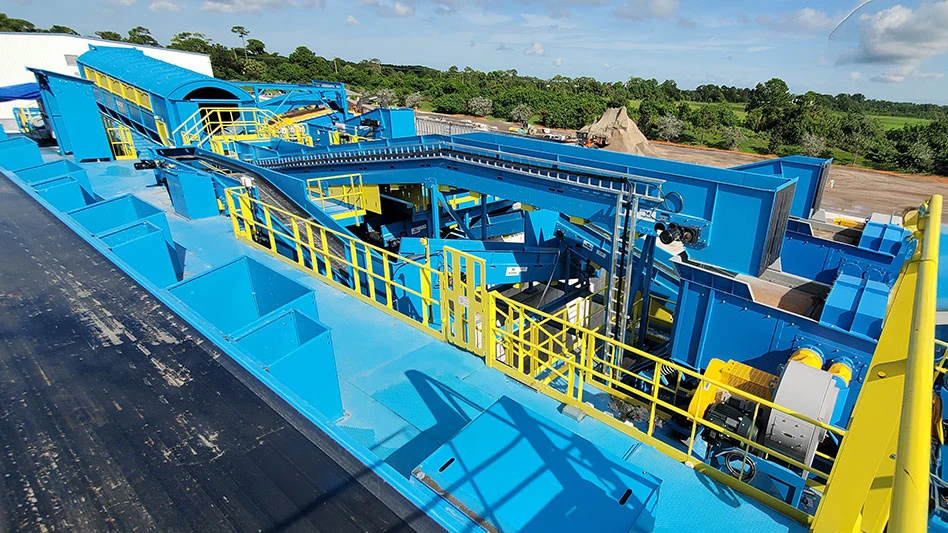Unlike the beleaguered first resident of 1600 Pennsylvania Avenue, American Compressed Steel Inc. (ACS) welcomes, and actively encourages, close scrutiny.
"We run an exceptional operation," says Arnold (Arnie) Warshawsky, president of the Kansas City, Mo.-based company. "If we can get a consumer to visit our facility it usually closes the deal for us."
ACS traces its origins back to the mid-1930s when it was owned by the Byer family of Cincinnati, Ohio. The present company was founded in 1974 when its holding company, Secondary Resources Inc., purchased all outstanding stock from the Byer family. Maurice Warshawsky, ACS’s chairman of the board and Arnie’s father, spearheaded the move.
At the time most scrap came in from dealers and peddlers in the Kansas City area. However, the new owners brought with them a different philosophy.
"We wanted to get scrap at its source," says Arnie. "Today, 75 to 80 percent of the material coming into our facilities is prompt industrial scrap from all kinds of metal-based manufacturers." The raw material is sourced from as far away as Iowa, Nebraska and Oklahoma and finished product is sold throughout the Midwest.
ACS continued to expand. In 1979, Sedalia Iron & Metal was formed. The yard, which is located approximately 90 miles east of Kansas City, was established as a feeder yard for the Kansas City operation. However, it became so big ACS began to add processing equipment to the operation. This included two balers and a sweat furnace.
In 1981, Missouri Iron & Metal was purchased as a feeder yard for Kansas City. The yard, which is located in approximately 45 miles north of Kansas City in St. Joseph, Mo., still operates as a feeder yard for the Kansas City operation.
ACS is truly a family-run operation. Arnie’s brothers are also in the business: Jeff Ross is a vice president; Tony Ross is president of the Sedalia yard; and Allan Ross is vice president of administration overall.
Manufacturing Facility
Today, ACS employs 85 people in the three facilities, according to Jeff. Employees process and keep track of 20,000 tons of mostly ferrous material each month. The advantage in dealing mostly with prompt industrial scrap is knowing what tonnage of material can be expected, he adds. ACS is then in a better position to fill its customers’ needs for material.
Aluminum is the largest percentage of nonferrous scrap processed, says Jeff.
He attributes this in part to the increased production of aluminum in the Kansas City area.
"For all scrap our philosophy is to segregate and sell alloy specific," says Arnie. He emphasizes that ACS "functions more like a manufacturing facility than a scrap facility, turning scrap inventories once to twice each month."
National and Regional Reach
Scrap is shipped nationwide. While the ferrous scrap stays primarily in the Midwest and Southwest, it has also gone to Mexico and Canada. Material is shipped by truck and train, and from Kansas City is loaded on river barges as well, going to consumers located on the Mississippi, Illinois and Ohio rivers.
ACS uses the Burlington Northern-Santa Fe and Union Pacific lines to ship material. As with other companies, ACS has had to deal with railroad company mergers and resultant gondola car shortages in the past few years. This is significant for ACS as most of its ferrous material is shipped by rail. Nonferrous material, on the other hand, moves mainly by truck.
"Shipments by truck are more reliable, especially for shorter distances," says Arnie. "The truck segment of our shipping is growing rapidly and has experienced considerable growth over the past 18 to 24 months."
Knows Their Customers
ACS places a high priority on maintaining excellent relationships with its customers.
"One of our business philosophies is to get to know our customers," says Jeff. "We want to know the people we buy from and sell to, personally."
Denis Battrum, ferrous marketing manager, seconds this view. "We try to sell directly to consumers in most cases," he says. "Communication is better this way."
"We are not sitting in the office waiting for a broker to call but rather we make the effort to contact the consumer," says Battrum. "We find out his or her needs and then work to fill them. The consumer knows we’ll supply the scrap from our own facilities, hence he or she is not at risk for the variability in quality and volumes inherent in the traditional broker/dealer supply network.
"Direct consumer contact also keeps us in better sync with the overall marketplace. Throughout the current recession in the scrap industry we’ve managed to keep our inventories in line thanks to relationships established with the mills: The result of a lot of effort over the years.
"Although it’s always been ‘you make your money on the buy’ – today the ‘sale’ is what counts."
Service includes renting compactors to those from whom they buy scrap. Jeff notes ACS offers paper recycling to its customers and will help them to recycle their used beverage cans (UBCs).
In fact, ACS takes enormous pride in its UBC recycling operation. The company processes a couple of hundred thousand pounds of cans each month. A certain percentage of sales, amounting to thousands of dollars, are used to fund the MO-KAN Food Bank in St. Joseph. This and other community efforts by the company earned ACS recognition as one of The Greater Kansas City Chamber of Commerce’s 1996 Top 10 small businesses.
"One of the people – a business magazine publisher – who was on the judging panel for the Greater Kansas City Chamber of Commerce said, ‘this is so cool, you’re really doing recycling, you’re not just a junk yard,’" recalls Jeff with a laugh.
Well Equipped
Before you ship material, however, you need to process it. And, ACS is well equipped to handle the job.
The Kansas City facility, according to Jeff, runs overhead cranes around the clock. Kansas City also has a Harris TG 1218 baler and a 923-AC Vezzani shear. Nonferrous material is processed with the help of a Mayfram conveyor that feeds a Selco baler.
The Sedalia operation runs Harris 320 and 220 balers. The facility also runs a United 990 furnace with a 20,000 pound holding chamber.
At Missouri Iron & Metal in St. Joseph, more peddler scrap than industrial scrap is handled. A half dozen forklifts and other equipment supports operations at the site. Jeff points out all three sites have the usual support equipment necessary to keep a successful, high-volume scrap company running successfully. ACS also maintains a large fleet of tractors and trailers and scores of containers at its customers’ facilities.
Environmentally Proactive
In addition to the tremendous effort expended on maintaining solid customer relationships and operational efficiencies, ACS is equally proactive in its approach to environmental issues.
"Our goal is to stay ahead of the curve on environmental issues and safety," says Arnie.
Efforts in this area include educating peddlers on what ACS will and will not accept. ACS maintains an "Objectionable Material" center (please see photo) near its buying area. This is a veritable "show and tell" center. Peddlers can have no doubt as to what material the company considers hazardous.
ACS will not accept whole used cars, gas tanks, brake pads, batteries, paint, any sealed units, refrigeration compressors and certain other appliances.
The company uses its environmental vigilance as a selling tool. "We ask customers and potential customers to compare what would be their downstream liability by working with us or with a competitor," says Denis.
Denis notes a customer who is assured in getting scrap from an environmentally well run operation is predisposed to doing business with that operation.
Arnie also emphasizes ACS has had a full-time environmental and safety manager the past six years.
He adds, "we were one of the first companies to receive storm water runoff permits. Our yards are paved and each facility is ‘guarded’ by radiation detection equipment."
"We run a clean operation," says Jeff. "Various service groups regularly tour our yards."
He recalls the time ACS staff received a standing ovation from two busloads of environmental safety people from military bases who came to tour our facilities.
Hunkering Down
No scrap company operates in a vacuum, and ACS is no exception. ACS is feeling the effects of the Asian crisis and the jitters running through the U.S. economy.
"Our volumes are up, but dollar sales are down," says Arnie. "With all the new steel coming into this country from Asia and Russia, and with domestic mills re-rolling imported semi-finished steel, the demand for scrap is dropping. We certainly don’t have a crystal ball about the future, but we’re hunkering down. We’re in survival mode. Fortunately we have forward thinking bankers."
ACS is no stranger to hard times. Arnie recalls the 22% interest rates in the late 1970s and early 1980s. "We’ve thought about calling ourselves ‘American Depressed Steel’ on more than one occasion," he laughs. But the company has hung on and emerged from each crisis, that much stronger, into an era of prosperity.
More recently, the great Kansas City flood of 1993 left ACS’s entire iron operation on the banks of the Missouri River under water.
"The yard had to be re-built from scratch," says Arnie. This entailed mounting the new shear on a platform so it now stands above the floodwall. Should the river flood again, the equipment will be protected.
Other Trends
Tottering Asian economies are not the only things figuring into the competitive mix in the scrap recycling industry. Arnie points to the proliferation of direct reduction plants.
"These plants are producing a scrap substitute and are putting a lot of tonnage on the market," says Arnie. He notes direct reduction plants can put a fixed price on their product, but this option is not available to the scrap industry.
Consolidation is another source of interest to ACS. As with others in the scrap recycling industry, ACS has watched wave after wave of consolidations sweep through the marketplace. ACS, however, doesn’t see a rosy path for consolidators.
"Consolidation will pause, if not stop dead in its tracks in the future," says Arnie. "Already it has come to somewhat of a stop."
Jeff adds some consolidators have grown at any cost. "Some have failed to make a profit," he says. "They’ve lost sight of what goes into a business relationship."
The Future
In the best of times, the scrap business is a highly competitive one. In an uncertain economy, it’s even tougher to survive and prosper. However, ACS is up to the challenge.
The company has built a solid reputation from decades of customer service and sound business practices.
"We’re excited about the future once we get by this difficult period for the industry," says Arnie. He notes the next generation, including his 33-year-old son, is already working for the company.
"Today, you have to be patient in these markets," says Arnie. "Our father taught us, ‘if you take care of the company, it will take care of you.’ And, we have always followed this advice."
The author is a former editor of
Recycling Today.

Explore the November 1998 Issue
Check out more from this issue and find your next story to read.
Latest from Recycling Today
- Greenwave raises revenue but loses money in Q2 2025
- Recycled steel prices hold steady
- EY says India’s need for scrap imports will continue
- Coming full circle
- Amcor, DCM introduce fertilizer packaging with 35 percent recycled content
- Comstock Metals gets closer to commissioning commercial-scale solar panel recycling facility
- Washington selects Circular Action Alliance as PRO
- Smurfit Westrock expands in Latin America





